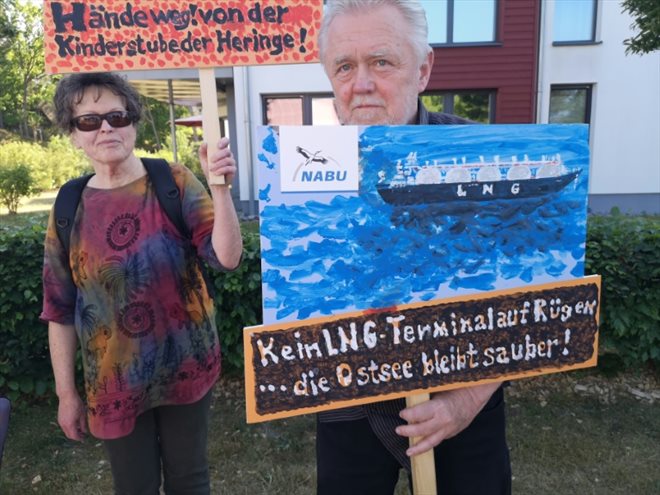Binz beach on the island of Rügen in northern Germany on June 6, 2023 (AFP/Sebastien ASH)
It was the breathtaking view of the bay that attracted Melanie Schmid to Rügen, a jewel of the Baltic Sea that she could leave because of a project to install a gas terminal off the island.
To replace Russian gas supplies, for the past year the German government has been setting up, at a run, platforms to import LNG, liquefied natural gas, all along its coasts.
Since the inhabitants of Rügen learned that the port of Mukran, a stone’s throw from the most famous chalk cliffs in the country, was in turn going to host a terminal, they have not taken off.
Melanie Schmid, an organic farmer who raises sheep and grows nuts, fears she will “not be able to sleep” because of the noise from the facilities intended to process LNG.
Some of the 65,000 inhabitants of the island have been leading the rebellion for several months, multiplying demonstrations, petitions, to express their concern about the possible repercussions on the environment and tourist activity.
“Are there no other places in the Baltic or the North Sea that would have less impact on nature, on people, on tourism than the island of Rügen?”, asks Karsten Schneider, the mayor of Binz, a seaside resort on the island.
White sand, old-fashioned beach huts, lagoon blue sea, wild moorland, Rügen is a popular holiday destination, also known for its fauna, flora and nature reserves.
– Security –

Opponents of the gas terminal installation project off the island of Rügen in northern Germany, June 6, 2023 (AFP / Sebastien ASH)
The decor of this “pearl of the Baltic” does not fit well with the vision of huge LNG carriers coming to deliver their LNG to the regasification platforms that the government wants to moor in Mukran.
“An industrial port simply has no place here,” said Thomas Kunstmann, 64, one of the organizers of a local group of activists.
A new gas pipeline around the island could also disrupt the ecosystem, passing directly through the herring breeding grounds, says Kunstmann.
The impact on the environment has been assessed, assures the Ministry of Economy and Climate, headed by the Ecologist Minister Robert Habeck. Under pressure from opponents, the government has already reduced the size of the initial project but does not intend to give up.
“We have only replaced a quarter of the supply capacities (in gas, editor’s note) lost” and previously coming from Russia, argued Mr. Habeck during a visit to the site, reiterating the importance of diversifying the suppliers.
The Russian flow, which supplied Germany with cheap gas, has dried up since the start of the Russian invasion of Ukraine, as Moscow first reduced its deliveries to Europe, before having to cut them off completely after the still unexplained sabotage of the Nord Stream gas pipeline eight months ago.
– Fossil fuel –
Germany has managed to avoid a major economic crisis this winter by turning in particular to the import of LNG, of which the United States and Qatar are major suppliers.
Three floating LNG terminals have been commissioned since the end of 2022, thanks to the billions of euros released by Berlin. Other platforms are being developed.
On Rügen, one doubts the usefulness of these additional capacities: “It seems that we will pass the next winter without major problems”, affirms Mr. Schneider, the mayor of Binz, since the shortages have been avoided so far .
A “security buffer” is however necessary to guarantee the energy supply against possible drops in imports in the event of “accidents, sabotage or other external events”, in a geopolitical context that is more tense than ever, says the Ministry of Economy.
He also points out that the terminals put into service are concentrated in the north-west of Germany, whose networks are saturated, while installations at the level of the Baltic Sea, further east, will make it possible to balance the service of the territory. .
Gas, liquefied or not, is “a climate-damaging fossil fuel”, retorts Mr. Kunstmann.
Kai Gardeja, responsible for tourism in the municipality of Binz, is worried about the risk of increased maritime traffic and noise pollution which could put off visitors.
This will not be the case for retired Manfred Steiner, 88, certain to return despite everything: “It’s simply great here”.
© 2023 AFP
Did you like this article ? Share it with your friends with the buttons below.




